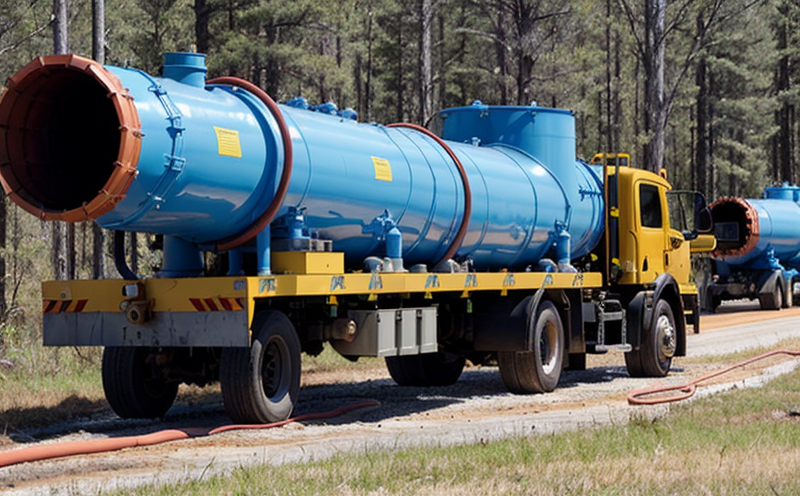CSA Z245 Steel Pipe Material Testing for Gas Pipelines
The CSA Z245 standard is a critical benchmark for ensuring the quality and safety of steel pipes used in natural gas distribution systems. This standard specifies material requirements, manufacturing processes, and testing methods to ensure that pipe materials are suitable for use in high-pressure natural gas applications.
The primary focus of CSA Z245 testing involves several key parameters that are critical for pipeline integrity and safety:
- Material composition
- Mechanical properties (yield strength, tensile strength)
- Creep resistance at operating temperatures
- Corrosion resistance to natural gas environments
- Thermal expansion behavior
The testing process involves a rigorous series of mechanical and chemical tests designed to evaluate the material's performance under various environmental conditions. The specimens used in these tests are typically cut from pipe sections, ensuring that the results reflect real-world performance.
EuroLab employs advanced metallurgical analysis techniques such as optical metallography, scanning electron microscopy (SEM), and energy-dispersive X-ray spectroscopy (EDX) to assess material composition. These analyses help confirm compliance with CSA Z245 requirements regarding specific alloying elements like carbon, silicon, manganese, sulfur, and phosphorus.
For mechanical testing, EuroLab utilizes state-of-the-art universal testing machines capable of applying controlled loads to simulate the stresses experienced by gas pipelines during installation and operation. This allows for accurate measurement of tensile properties that are critical in ensuring the pipe's ability to withstand pressure without failure.
The creep resistance tests are conducted at elevated temperatures, which is essential because natural gas distribution systems often operate under high pressures and temperatures. These tests simulate long-term service conditions to evaluate how well the material retains its mechanical integrity over time.
Corrosion testing is another crucial aspect of CSA Z245 compliance. EuroLab uses accelerated corrosion test methods that expose pipe specimens to simulated natural gas environments. This helps determine whether the material can resist degradation due to chemical reactions with gases like hydrogen sulfide, which are common in natural gas streams.
Thermal expansion behavior is evaluated through differential thermal analysis (DTA) and dilatometric testing. These tests help ensure that the pipe materials expand and contract within acceptable limits as temperatures fluctuate during service operations.
The results of these tests are meticulously documented, ensuring complete traceability to international standards like ISO 15156 and ASTM A370. Compliance with CSA Z245 is essential for maintaining safety in natural gas distribution networks and preventing potential leaks or failures that could lead to hazardous situations.
Our comprehensive testing services provide quality managers and compliance officers with the assurance they need to make informed decisions about material selection and pipeline integrity. By adhering strictly to CSA Z245 requirements, we help ensure that gas pipelines are not only safe but also optimized for performance in demanding environments.
Applied Standards
The testing performed by EuroLab is aligned with the stringent requirements of CSA Z245, which sets forth detailed specifications for steel pipes intended for use in natural gas distribution systems. This standard ensures that materials meet specific mechanical and chemical properties necessary for safe and reliable pipeline operation.
- CSA Z245: Specifies material requirements, manufacturing processes, and testing methods for steel pipes used in high-pressure natural gas applications.
- ISO 15156: Provides guidelines for the mechanical properties of carbon steel and low-alloy steel for welded pressure vessels and piping systems.
- ASTM A370: Covers methods of tensile testing of steel products, which is crucial for determining compliance with CSA Z245 specifications.
Our compliance with these standards ensures that the test results are reliable and can be trusted by regulatory bodies and industry professionals. This alignment also facilitates seamless integration into existing quality control processes within power & utilities organizations.
The testing methodologies used at EuroLab go beyond mere compliance; they provide a deeper understanding of material behavior under various conditions, which is invaluable for continuous improvement efforts in pipeline design and maintenance practices.
Eurolab Advantages
EuroLab offers unparalleled expertise and advanced capabilities in the field of CSA Z245 steel pipe material testing. Our state-of-the-art facilities and experienced technical staff provide a comprehensive suite of services that exceed industry expectations.
- Comprehensive Testing Capabilities: We offer a full range of mechanical, chemical, and environmental tests to ensure compliance with CSA Z245 standards.
- ISO 17025 Accreditation: Our laboratory is ISO 17025 accredited, ensuring the highest level of quality in our testing processes.
- Advanced Instrumentation: Utilizing cutting-edge equipment like universal testing machines and scanning electron microscopes allows for precise measurement and analysis.
- Experienced Technicians: Our team includes highly skilled metallurgists and engineers who have extensive experience in the power & utilities sector.
- Rapid Turnaround Times: We pride ourselves on providing quick, reliable results to keep your projects on schedule.
- Detailed Reporting: All test results are accompanied by detailed reports that include traceability to international standards and recommendations for material selection.
- Custom Solutions: Whether you have unique requirements or need tailored testing protocols, our team can provide custom solutions to meet your specific needs.
By choosing EuroLab, you gain access to the most advanced facilities and expertise in the industry. Our commitment to excellence ensures that every test result is accurate, reliable, and meets the highest quality standards.





